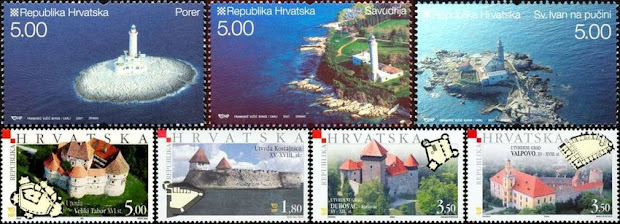Once upon a time Slovenes and Croats said they lived in a country that stretched "od Triglava do Vardara", from the Triglav mountain in the extreme north-west of Slovenia to the Vardar river in south-eastern Macedonia. Close to the Macedonian town of Gevgelija, or Đevđelija, the Vardar crosses the Greek border to empty into the Aegean Sea, not far from Thessaloniki. Therefore, also the variant "od Triglava do Đevđelije" was popular among the partisans who created Yugoslavia on the ruins of World War II.
It's easy to forget how large a county the Socialist Federal Republic of Yugoslavia was. With its area of 255,804 square kilometers it was bigger than the United Kingdom or Romania. Austria fitted almost three times into it and only eight American states are bigger. Today, Serbia without Kosovo is smaller than Austria, and Ireland outsizes Croatia.
Slovenia and Croatia were the two leading republics in the break-up of Yugoslavia. Both felt exploited and dominated by Belgrade and declared independence on the same day, 25 June 1991. What followed is history and so is their close cooperation from those days. Now safely in the EU, Slovenia seems to have turned into Croatia's main external obstacle to a quick entry into the Union. As you can read everywhere Slovenia blocked the opening and closing of some chapters of Croatia's accession negations.
It's not the first time that the Slovenes anger Croats. Last year Slovenia introduced a vignette for its highways and motorways. As the vignette is available for either six or twelve months, many Croats feel injured for several reasons. First, going to Ljubljana for shopping or just refueling (Slovenia has lower fuel prices than Croatia) became more expensive. Second, many Croats suspect that Slovenia intentionally delays building highways in order to isolate Croatia from the rest of Europe. Looking at the
map of Slovenian roads, that suspicion is maybe not without justification. As an impartial observer I can safely say that the speed of highway construction in Slovenia is staggeringly slow. Third, most tourists come to Croatia by car, passing through Slovenia. They need to pay a relative large sum to use a little stretch of highway.
And now Slovenia blocked Croatia's progress towards EU membership. It accuses Croatia of using certain documents in the negotiations that claim an unfair share of the Adriatic Sea close to the Slovenian town of Piran. One look at the map below and it is clear why the Bay of Piran is crucial to Slovenia. Without it, Slovenia doesn't have access to international waters.

Croats used to make fun of Slovenia's coast and sea (read more
here) which they find hugely inferior to their majestic coast. I don't think they laugh any more. Of course, the Slovenian veto against Croatia is petty-minded, but so is, if you ask me, Croatia's reluctance to grant Slovenia the Bay of Piran. Croatian coastal beauty is in another league anyway, with of without that bay.
 Today Slovenia and Croatia agreed, finally, on a deblokada. Prime ministers Pahor (Slovenia) and Kosor (Croatia) hammered out a deal that allows Croatia to continue its negotiations with the EU. The border dispute itself is not solved, but the two parties agreed on the rules of the game. First, anything that has been said or written about the border after 25 June 1991 (when both Slovenia and Croatia proclaimed independence) has no legal status. This is a Croatian concession to Slovenia, as the latter country blamed Croatia of producing documents with falsified borders. Slovenia accused Croatia of using these "post 26.06.91" documents in its EU negotiations and so prejudice the border. Second, Croatia and Slovenia will seek international arbitration for their conflict. This had been often proposed by the EU, but Slovenia, for some reason, always objected. Pahor said that in that way the conflict will be solved before Slovenia ratifies Croatia's EU accession.
Today Slovenia and Croatia agreed, finally, on a deblokada. Prime ministers Pahor (Slovenia) and Kosor (Croatia) hammered out a deal that allows Croatia to continue its negotiations with the EU. The border dispute itself is not solved, but the two parties agreed on the rules of the game. First, anything that has been said or written about the border after 25 June 1991 (when both Slovenia and Croatia proclaimed independence) has no legal status. This is a Croatian concession to Slovenia, as the latter country blamed Croatia of producing documents with falsified borders. Slovenia accused Croatia of using these "post 26.06.91" documents in its EU negotiations and so prejudice the border. Second, Croatia and Slovenia will seek international arbitration for their conflict. This had been often proposed by the EU, but Slovenia, for some reason, always objected. Pahor said that in that way the conflict will be solved before Slovenia ratifies Croatia's EU accession.









